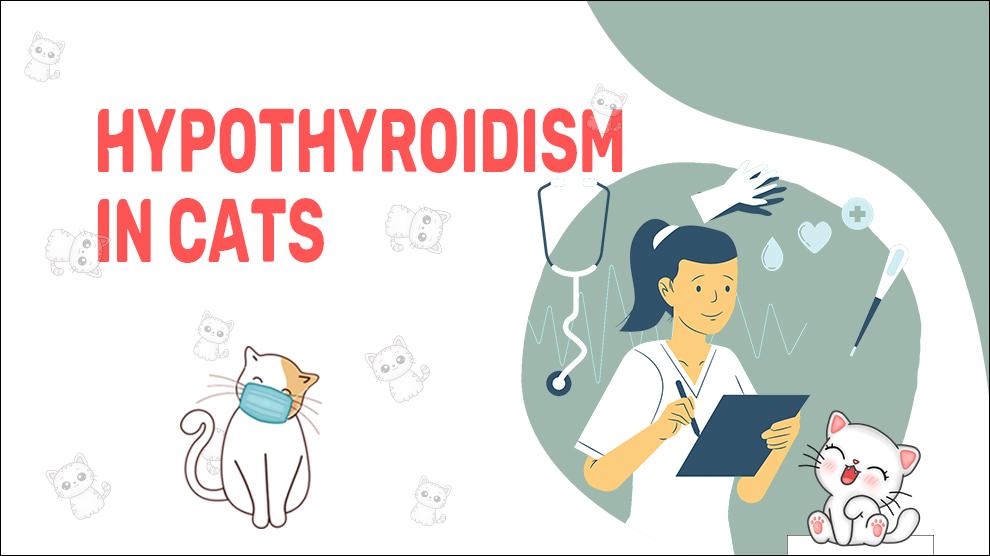What Is Hypothyroidism In Cats?
Hypothyroidism is a condition that affects cats when their thyroid gland is not producing enough thyroid hormone.
The thyroid hormone is responsible for regulating the metabolism of the body, and a deficiency in this hormone can lead to various health issues in cats.
This condition is not very common in cats, but it can be a serious problem if left untreated.
Clinical Signs Of Hypothyroidism In Cats
The symptoms of hypothyroidism in cats can be subtle and can take some time to develop.
Some of the most common symptoms include:
- Weight gain and difficulty losing weight
- Lethargy and decreased activity levels
- Hair loss and dull coat
- Cold intolerance
- Constipation
- Increased thirst and urination
- Reduced appetite
- Decreased heart rate
- Muscle weakness and stiffness
- Dry Skin
- Lack Of Appetite
- Scaly Skin
- Hypersensitive To Cold
- Matted Hair
- Weakness
- Lower Body Temperature
- Inactive
Treatment Options For Hypothyroidism In Cats
Treatment for hypothyroidism in cats typically involves medication to replace the missing thyroid hormone.
The medication is usually administered orally, and the dosage is based on the cat's weight and the severity of the condition.
It is important to follow the veterinarian's instructions carefully and monitor the cat's progress regularly.
In some cases, dietary changes or supplements may also be recommended to support the cat's overall health.
Home Remedies For Hypothyroidism In Cats
There are no proven home remedies for hypothyroidism in cats, and it is important to seek veterinary care for proper diagnosis and treatment.
However, feeding the cat a healthy and balanced diet can help support overall health and may help prevent certain health problems.
How To Prevent Hypothyroidism In Cats?
Preventative measures for hypothyroidism in cats include maintaining a healthy diet, ensuring that the cat receives adequate iodine in their diet, and regular veterinary check-ups to monitor thyroid function.
It is important to follow the veterinarian's recommendations for preventative care and to seek prompt medical attention if any symptoms of hypothyroidism are noted.
Affected Cat Breeds Of Hypothyroidism
Hypothyroidism can occur in cats of any breed, but it is more common in certain breeds such as Siamese, Himalayan, and Persian cats.
Causes For Hypothyroidism In Cats
Causes:
The most common cause of hypothyroidism in cats is an autoimmune disease called lymphocytic thyroiditis.
This condition causes the cat's immune system to attack the thyroid gland, leading to a decrease in thyroid hormone production.
Other causes of hypothyroidism in cats include iodine deficiency, congenital disorders, cancer, and the use of certain medications.
When To See A Vet For Hypothyroidism In Cats?
If you notice any symptoms of feline hypothyroidism in your cat, it is important to consult with a veterinarian.
The vet can perform blood tests to check your cat's thyroid hormone levels and determine whether or not your cat has hypothyroidism.
Early diagnosis and treatment of feline hypothyroidism can improve your cat's quality of life and prevent the development of other health problems.
Therefore, it is important to see a vet as soon as you suspect your cat has this condition.
Food Suggestions For Hypothyroidism In Cats
Feeding the cat a balanced and nutritious diet is important for overall health and may help support thyroid function.
Foods that are rich in iodine, such as seaweed and fish, may be beneficial for cats with hypothyroidism.
It is important to consult with a veterinarian or veterinary nutritionist to determine the best diet for your cat's individual needs.
Conclusion
Hypothyroidism in cats is a condition that can be managed with proper treatment. Regular check-ups with a veterinarian can help detect the condition early, which can lead to a better prognosis.
Treatment involves replacing the missing thyroid hormone through medication, and regular blood tests are necessary to ensure that the dosage is correct.
While there are no known home remedies or specific dietary recommendations for cats with hypothyroidism, a healthy, balanced diet is always recommended for optimal health.











